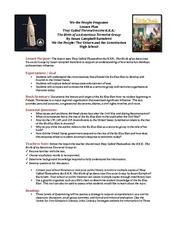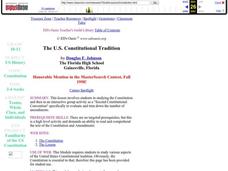Heritage Foundation
Procedural Amendments: Amendments III, IV, and V
So many US Constitution clauses, so little time. The 17th installment in a 20-part series teaches pupils about the Third, Fourth, and Fifth Amendments. Learning through activities such as group work, connecting to current events, and...
Heritage Foundation
Substantive Amendments: Amendments I and II
The First and Second Amendments remain some of the most famous, even to this day. Learners read about several clauses from the US Constitution through a variety of captivating activities including before and after reading, group work,...
Heritage Foundation
Congress's Territorial Powers, Implied Powers, Citizenship, and the Bureaucracy
An informative resource gives scholars a look into why the US Constitution placed certain federal powers over that of the state. A variety of activities about constitutional clauses helps to create meaningful learning.
Curated OER
Judges in the Classroom Lesson Plan History Of The Bill Of Rights
Learners study the Bill of Rights and the US Constitution. They investigate the authors of the Bill of Rights and play a game based on the research.
Curated OER
The U.S. Constitution:Continuity and Change in the Governing of the United States
Students interpret historical evidence presented in primary and secondary resources. In this U.S. Constitution lesson, students examine and analyze primary sources regarding the plan for U.S. government.
Curated OER
The Called Themselves the K.K.K.; The Birth of an American Terrorist Group
How did Ku Klux Klan develop and flourish in the US? How did the government respond to acts of terrorism conducted by the KKK following the Civil War? How does the government respond to acts of terrorism today? This resource...
Judicial Learning Center
Judicial Independence: What’s Wrong with This Court?
Why is it important for judges to operate independently of politics or other branches of government? Scholars ponder the question as they examine video clips, case studies, excerpts of the US Constitution, and an interactive computer...
Judicial Learning Center
About Federal Judges: Qualifications of Judges
"Help Wanted: A Supreme Court Justice." What should be included in the ad? Learners ponder the question during a lively activity that asks them to examine the qualifications for various federal offices and then create job postings....
Curated OER
American Focus on World Constitutions
Eighth graders describe essential components of a constitution and cite cultural factors affecting international law-making.
Curated OER
American Studies
Entitled American Studies, this small unit covers various topics related to the study of the United States. Learners warm up by creating a dictionary of democracy, then dive into three different lessons focused on government, famous...
Curated OER
US Government: The Checks and Balances System of the US Constitution
Students examine the responsibilities of the 3 branches of U.S. government. In this checks and balances lesson plan, students identify the powers of the legislative, executive, and judicial branches of government. Students share examples...
Curated OER
Judges in the Classroom Lesson Plan History Of The Bill Of Rights
Students study the US Constitution, The Bill of Rights, and other amendments. They investigate the people who obtained the Bill of Rights and play a game based on their studies.
Curated OER
Lesson 4: The Judiciary: A Brief Introduction to the Courts System
Focusing on the judicial branch of government, the fourth lesson in this series explores the structure of the US courts system. Beginning with an engaging activity based on the short story The Lady or the Tiger, students go on...
Curated OER
U.s. Constitution Roll Call Test
Learners act as newspaper reporters from 1787 and interview some of the signers of the Constitution. They study the contributions of these Founding Fathers: Washington, Franklin, Madison, Hamilton and discuss the purpose of the U.S....
Judicial Learning Center
The U.S. Supreme Court
How do Supreme Court justices determine which cases to consider? What happens when the Supreme Court decides not to take a case? The lesson explores important questions and others in the field of criminology. It focuses on the...
Advocates for Human Rights
Human Rights Defined
Class members continue their investigation of the factors that influence migration with a instructional activity on human rights. As they examine the Universal Declaration of Human Rights and selected US Constitutional Amendments,...
Curated OER
The U.S. Constitutional Tradition
Students study the Constitution and then in an interactive group activity create a "Second Constitutional Convention" specifically designed to evaluate and trim down the number of amendments.
Curated OER
We the People Level 2
Students explore U.S. history by participating in a government activity. In this Constitution lesson, students identify the role government plays in our society and the differences the British colonies had in the early 18th century....
Curated OER
The Constitution.
Second graders study the Constitution. They examine the meaning and fundamentals of the Preamble of The Constitution of USA. They assess the importance of having a Supreme Law that states the rights and obligations of the citizens. They...
Classroom Law Project
What does the Constitution say about voting? Constitutional Amendments and the Electoral College
As part of a study of voting rights in the US, class members examine Constitutional amendments connected with voting and the role of the Electoral College in the election process.
C-SPAN
Presidential Birth Requirement
Every president of the United States must be a natural-born citizen, but the definition of natural-born is not as straightforward as it seems. Secondary scholars examine two points of view surrounding the constitutional requirement...
Center for Civic Education
Lesson 2: Suffrage Amendments
Youngsters examine selected amendments to the Constitution to determine how voting requirements in the US have changed from the colonial days to the present.
NPR
Civil Rights of Japanese-American Internees
Prompted by a viewing of Emiko and Chizu Omori’s Rabbit in the Moon, a documentary about the internment of Japanese-Americans during World War II, high schoolers examine a series of documents, including the Bill of Rights and the UN’s...
Curated OER
Equal Protection of the Law: Fact or Fiction
High schoolers focus on the 14th Amendment of the Bill of Rights to decide whether or not racism denies citizens of their rights under the amendment. They watch a movie, Every Two Seconds and complete a worksheet (included in the plan)...























